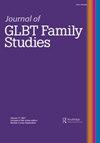成年人的性取向、与父母的关系、压力和抑郁症状
IF 2
Q2 FAMILY STUDIES
引用次数: 8
摘要
摘要抑郁症状与性取向之间的差异已被充分记录在案,但对其起源知之甚少。这项研究考察了即使在成年后,不太有利的父母关系是否与性取向导致的抑郁症状差异有关。横断面数据来自国家青少年至成人健康纵向研究的第四波。男同性恋和双性恋(GLB)参与者报告称,与异性恋参与者相比,他们的父母关系质量较低,压力更大,抑郁症状更多。父母关系质量越低,压力越大。较高的压力和较低质量的父母关系与更多的抑郁症状相关。GLB个体的父亲关系质量较低,压力较大,这在一定程度上介导了性行为和抑郁症状的关联。女同性恋和双性恋女性报告称,母亲关系质量较低,压力较大,这完全介导了性行为和抑郁症状的联系。虽然男性的母亲关系质量没有差异,但与异性恋男性相比,同性恋和双性恋男性的母亲联系质量与抑郁症状的相关性更强。即使在成年后,GLB个体中更大的压力和抑郁症状至少部分是由不太有利的父母关系造成的。本文章由计算机程序翻译,如有差异,请以英文原文为准。
Sexual Orientation, Relationships with Parents, Stress, and Depressive Symptoms among Adults
Abstract Disparities in depressive symptoms as a function of sexual orientation have been well documented, but less is known about their origins. This study examines whether, even in adulthood, less favorable parental relationships are associated with disparities in depressive symptoms as a function of sexual orientation. Cross-sectional data were drawn from Wave IV of the National Longitudinal Study of Adolescent to Adult Health. Gay, lesbian, and bisexual (GLB) participants reported lower quality parental relationships, greater stress, and more depressive symptoms than did heterosexual participants. Lower quality parental relationships were associated with higher stress. Higher stress and lower quality parental relationships were associated with more depressive symptoms. GLB individuals reported lower father relationship quality and higher stress, which partially mediated the association of sexuality and depressive symptoms. Lesbian and bisexual women reported lower mother relationship quality and higher stress, which fully mediated the association of sexuality and depressive symptoms. While no differences in mother relationship quality existed for men, mother relationship quality was more strongly associated with depressive symptoms for gay and bisexual men than for heterosexual men. Even in adulthood, greater stress and depressive symptoms among GLB individuals were at least partially accounted for by less favorable parental relationships.
求助全文
通过发布文献求助,成功后即可免费获取论文全文。
去求助
来源期刊

JOURNAL OF GLBT FAMILY STUDIES
FAMILY STUDIES-
CiteScore
3.90
自引率
0.00%
发文量
0
期刊介绍:
The Journal of GLBT Family Studies is a much-needed resource on the working dynamics of the diverse family structures found in every corner of the world. This groundbreaking new journal addresses the vital issues facing gay, lesbian, bisexual, and transgender individuals and their families. Edited by Dr. Jerry J. Bigner, who has provided expert witness testimony in legal cases and in the litigation involving same-sex marriages in Canada, the journal features interdisciplinary studies and scholarly essays on topics related to GLBT family life and functioning as well as relationships with other families.
 求助内容:
求助内容: 应助结果提醒方式:
应助结果提醒方式:


